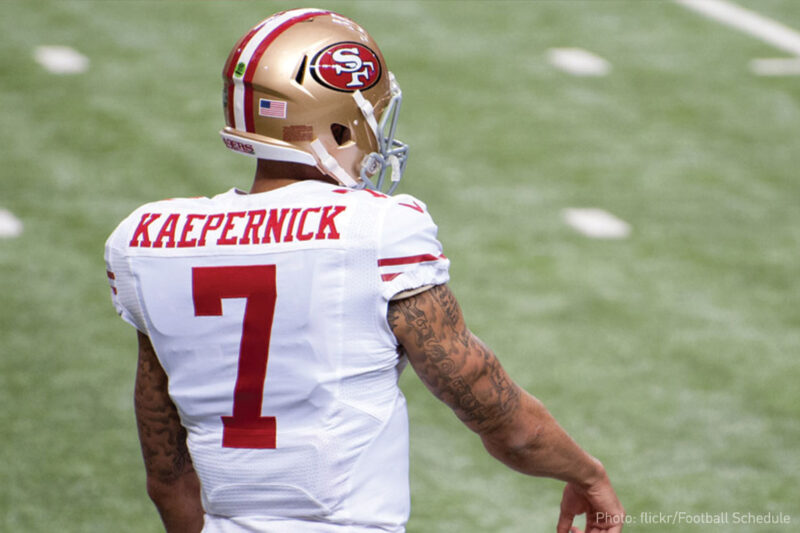The San Francisco 49ers’ Colin Kaepernick Kneeled So That We May All Stand Taller


It’s hard to speak with your face pressed against concrete. Or when you can’t breathe. Or with a broken neck. And even when you manage to speak, people in power seek to silence you. Just ask the San Francisco 49ers’ Colin Kaepernick.
The all-too-familiar voices of the status quo tried to quiet Kaepernick as soon as he began to protest. They want Americans of conscience to just sit down and shut up. Unfortunately for them, they didn’t say anything about kneeling. Kaepernick has been doing just that, and in doing so, has spoken volumes.
Kaepernick’s protest isn’t about the flag. It isn’t about the “The Star Spangled Banner,” which has its own racist roots. As Kaepernick himself said, “[T]his is bigger than football and it would be selfish on my part to look the other way. There are bodies in the street and people getting paid leave and getting away with murder.”
Kaepernick is kneeling to protest the unrelenting state of police violence against communities of color. These are figures you may have heard before but bear repeating: Though we comprise 13 percent of the American population, Black people were the victims of of 25 percent of fatal police shootings this year.
Statistics citing the number of civilians killed by police provide an alarming snapshot of the state of law enforcement relationships with communities of color, but they do not tell the whole story. They don’t speak to the trauma of racialized policing in schools. They don’t speak to the reality of unequal policing of communities of color. They don’t speak to the harms associated with arrest and pretrial detention. They don’t speak to our nation’s underfunded and overburdened public defender system and its disastrous impact on people solely because they are poor. They don’t speak to harsher sentences based on race. They don’t speak to the unseen and innumerable collateral consequences faced by individuals and their communities as a result of an unfair criminal justice system.
Statistics tell us a lot, but they cannot adequately explain anyone’s story of discrimination. They can’t convey their individual experience as a person of color. They can’t bring home the trauma of their involvement, even indirectly, with the complex and massive web of the world’s largest criminal justice system. We should be talking about what the statistics don’t tell us.
When we talk about the criminal justice system, we’re talking about a system — a horrendous system of violence and silencing that threatens to perpetuate itself as long as we as Americans don’t speak up. The First Amendment grants all of us the right to speak — or remain silent if we choose. As President Obama made clear, Kaepernick is “exercising his constitutional right to make a statement.”
For those of us who have taken to the streets, and the page, and the courts, and the field, it is our conscience and frustration that gives rise to a duty to speak. In spite of a barrage of social pressures and unconstitutional state actions, communities of color and their allies are resisting calls for “respectability,” refusing to allow their voices to be policed by those in power.
Exercising our constitutional rights to criticize policies and practices that have failed us is not unpatriotic. In fact, holding our society to the aspirational standards we set for ourselves — liberty and justice for all — is one of the purest forms of patriotism.
On issues of racial oppression and police violence, it is our responsibility to speak in solidarity with our communities of color in furtherance of the principles upon which this country was founded. Kaepernick’s fellow athletes, many of them who are men of color, have accepted this responsibility in light of his protest.
In support of Kaepernick, former NFL star Shannon Sharpe said, “Hear me, I’m trying to have a conversation … [this is a] … peaceful route … Colin Kaepernick sitting down and taking a knee.” Denver Broncos’ Brandon Marshall referred to Kaepernick as “one of the biggest patriots out there … [b]ecause he’s standing up for human rights.”
The message is spreading.
So rather than urging a football player to stay in his lane and be grateful for the financial success he has enjoyed in his career, we should recognize the truths that inspired and fuel his protest. It is our responsibility, each and every one of us, to speak our truths to power.
Stay informed
Sign up to be the first to hear about how to take action.
By completing this form, I agree to receive occasional emails per the terms of the ACLU's privacy statement.
By completing this form, I agree to receive occasional emails per the terms of the ACLU's privacy statement.

